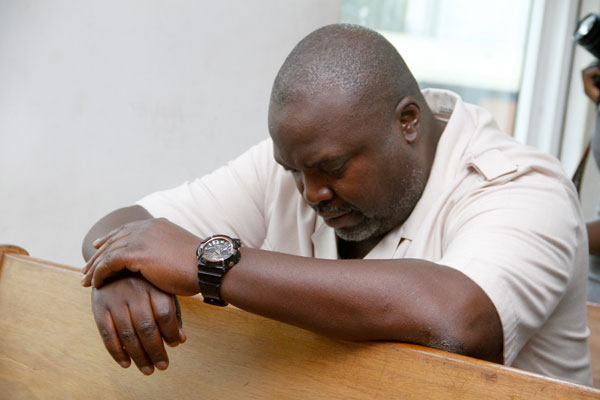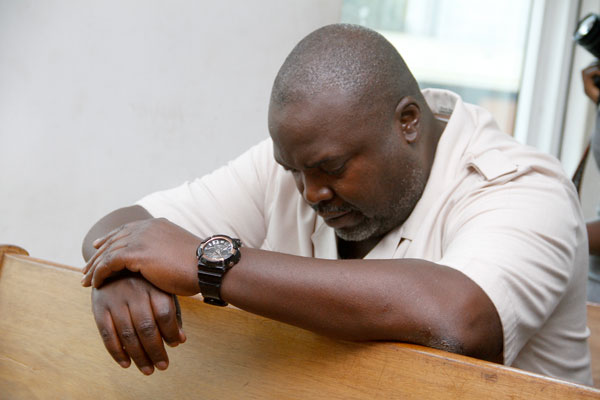Prime
Jamwa’s bail cancelled, sent back to Luzira to serve 12-year sentence

In this file photo, former National Social Security Fund (NSSF) managing director David Chandi Jamwa reacts after being told that he's to continue serving his 12 year jail term by the Court of Appeal on January 15, 2018. PHOTO/ABUBAKER LUBOWA
What you need to know:
- However, in a dissenting judgment, the two justices Esther Kisaakye and Jotham Tumwesigye ruled that the judgement delivered by Justice Kenneth Kakuru of Court of Appeal was illegal thus the case should go back to the Court of Appeal to correct the errors made.
- Jamwa was found guilty of causing Shs 3.1 billion financial loss to NSSF in February 2011 by the Anti-Corruption court when he prematurely sold treasury bonds to defunct Crane Bank while he was the managing director.
The highest court in the land has cancelled former National Social Security Fund (NSSF), managing director, David Chandi Jamwa’s bail and sent him back to Luzira prison to continue serving his 12-year sentence for causing a financial loss of Shs3.1billion to government.
In a majority decision, three of the five justices on the panel said that they did not find any merit in Jamwa's grounds of appeal which were accordingly dismissed.
"We find the appellant's (Jamwa) sentence of 12 years imprisonment for causing financial loss contrary to section 20 of the Anti-Corruption Act imposed by the trial court and confirmed by the Court of Appeal a legal sentence," ruled the justices; Eldad Mwangusya, Lillian Tibatemwa and Paul Mugamba.
The justices added that they found no reason to interfere with the sentence.
“After re-evaluation of the mitigating factors for the appellant, we find that the Court of Appeal legally sentenced the appellant to four years imprisonment for the offense of abuse of office. As a result, having found that all the grounds of appeal failed, this appeal is hereby dismissed. We uphold the decision of the Court of Appeal."
Jamwa had argued that the Court of Appeal delivered its judgement without the requisite quorum. However, the justices ruled that a judge who has appended a signature on a judgement loses the right to change their mind as soon as they cease to be on the court.
“Justice Rubby Opio-Aweri lost the authority to alter the judgement as soon as he appended his signature to the judgement before he ceased to be a justice of the Court of Appeal which he is bounded to,” ruled the justices.
Court also ruled that the then deputy Chief Justice Steven Kavuma who at the time of retirement had neither appended his signature on the judgement that was in place nor authored an independent judgement lost the authority since he ceased being a Justice of the Court.

Jamwa (centre) uses a laptop at Supreme Court as he waits the judges' decision on November 29, 2019. PHOTO BY JULIET KIGONGO
The three justices explained that even if the date of signature and delivery of the judgement are different, it does not affect the validity of the signed document for as long as the judge is still a member of the court.
However, in a dissenting judgment, the two justices Esther Kisaakye and Jotham Tumwesigye ruled that the judgement delivered by Justice Kenneth Kakuru of Court of Appeal was illegal thus the case should go back to the Court of Appeal to correct the errors made.
“When a judge dies or vacates court for whatever reasons, he or she is no longer possessed of the jurisdiction to deliver a judgement of court and if he or she cannot do so, neither can another person do so on his behalf,” the two justices ruled.
READ:
The Supreme Court being the last appellant court in the land, Jamwa is now out of options. He will have to serve his jail term.
Jamwa was found guilty of causing Shs 3.1 billion financial loss to NSSF in February 2011 by the Anti-Corruption court when he prematurely sold treasury bonds to defunct Crane Bank while he was the managing director.
Unsatisfied with the ruling, Jamwa appealed the sentence, applied and was granted bail on June 24, 2011 by Court of Appeal judge Augustine Nshimye.
On May 15, Justice Stella Arach-Amoko of the Supreme Court granted him bail pending the hearing of his Appeal in the Supreme Court. Since then, Jamwa had until, November 29, 2019, enjoyed autonomous freedoms even when the Court of Appeal upheld the sentence in 2015.




